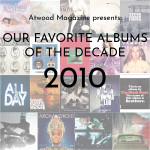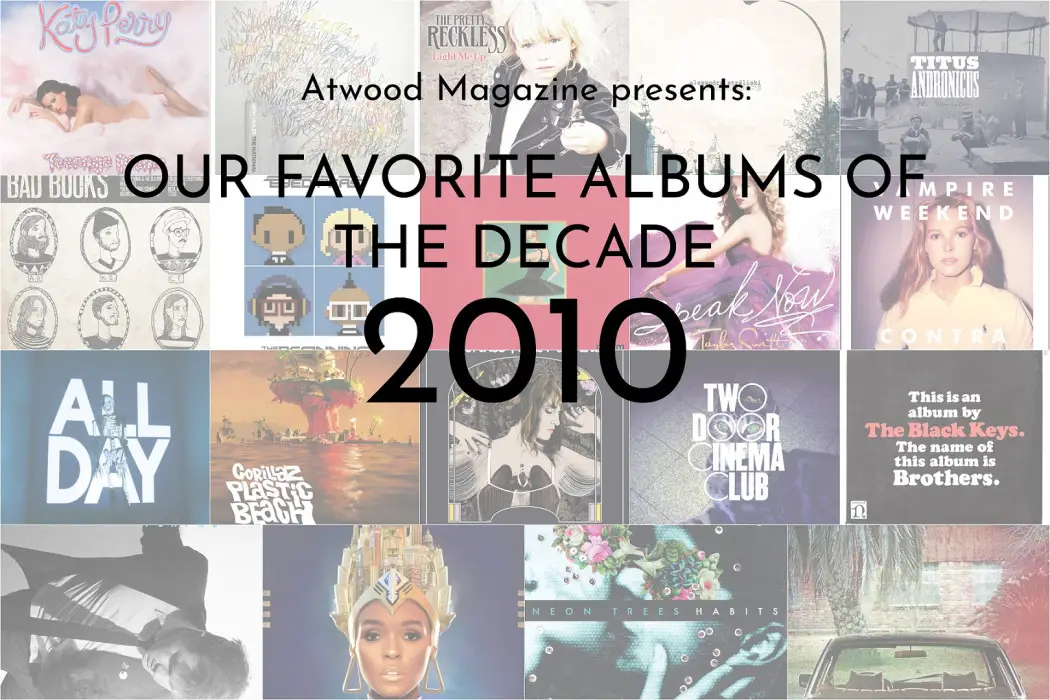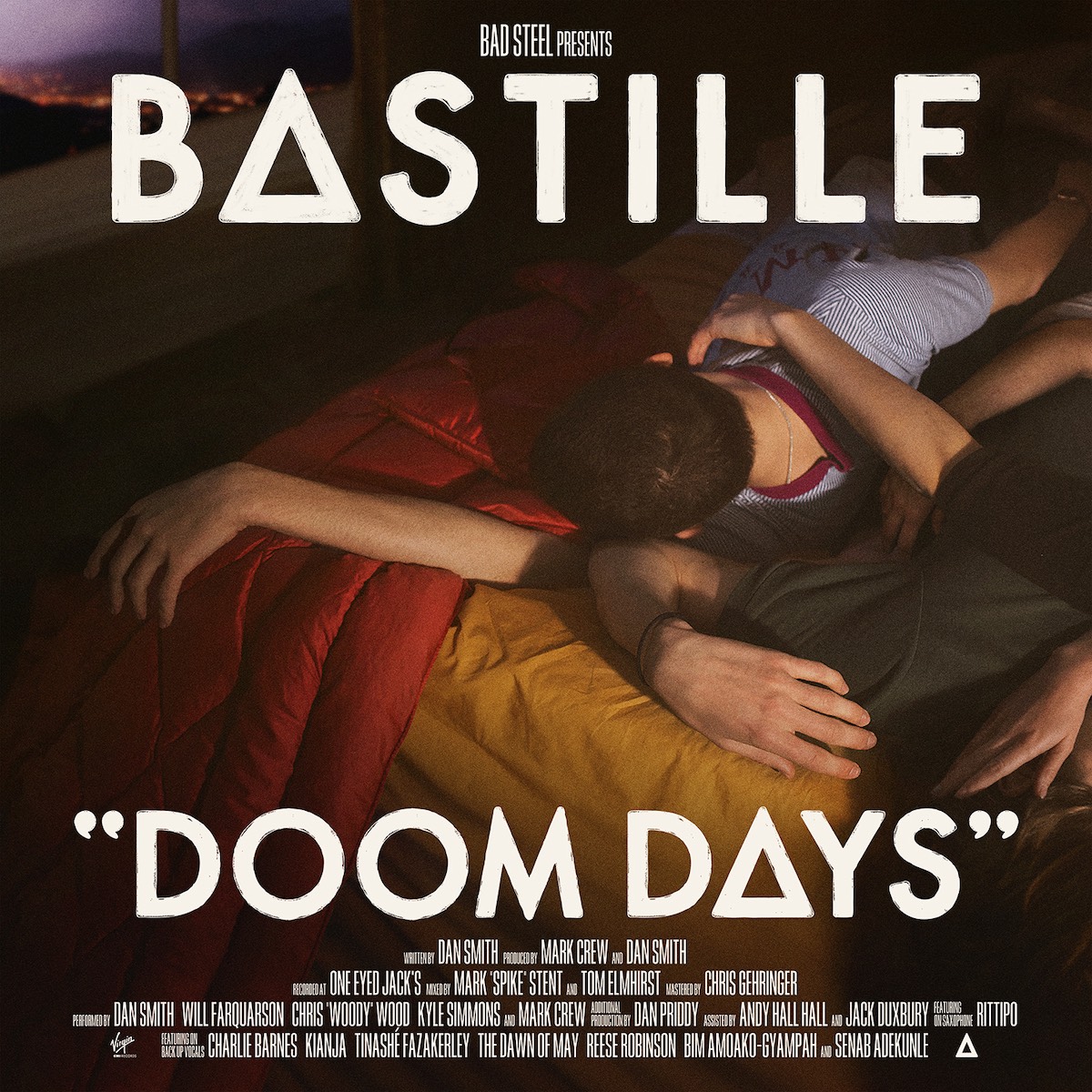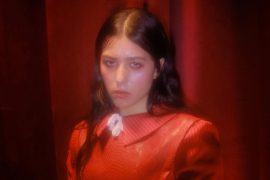Vampire Weekend The Pretty Reckless Alexandra Stréliski Arcade Fire Bad Books Black Eyed Peas Florence + The Machine Girl Talk Gorillaz Janelle Monáe Kanye West Katy Perry LCD Soundsystem Taylor Swift Neon Trees The Black Keys The National Titus Andronicus Two Door Cinema Club
The 2010s are coming to a close, and with them ends an exciting era of musical innovation and societal transformation. The past ten years have seen the breakdown of genre, increased accessibility for content creators, and new modes of access for music consumers. Downloads bowed to streams in the West, and artists like Justin Bieber, Drake, and Taylor Swift rose to international superstardom – but this is just the tip of the iceberg of a busy, busy age; it seemed like the more connected we were, the more disconnected we felt. Music was a means of transcending distraction and hardship; a vessel of understanding that lent us stability for moments of stress and doubt.
How better to capture a decade in music than in the words of those who lived it and breathed it? Atwood Magazine is proud to present Our Favorite Albums of the Decade, in no particular order (you can jump directly to an artist by clicking their name above, and return to the top of the page by clicking any album art below). For ten weeks, our writers will be breaking down the music of the 2010s year by year. These are the records that shaped the people we are today: The music that carried us through pivotal milestones, the songs that together form the soundtracks to our lives. We have grown and changed, matured and evolved, but in this time of reflection, we can still feel the sense of wonder we felt as listeners pressing “play” for the very first time.
This week we celebrate 2010 in all its eclectic glory: From Vampire Weekend’s nostalgic and memory-shaping Contra, to Girl Talk’s marathon-like All Day, Florence + The Machine’s career-defining Between Two Lungs, and Kanye West’s momentous My Beautiful Dark Twisted Fantasy.
Mitch Mosk, Editor-in-Chief
— —

 Our Favorite Albums of the Decade
Our Favorite Albums of the Decade 
Our Favorite Albums of 2010
Contra is coming back to college after spending your winter break at home with family; it’s reuniting with old friends after years apart, and picking up where you last left off; it’s the alternate reality you wish could be real life, and every time you’re there you ask yourself, “Why not? Why can’t I make this my reality?” only to find yourself reluctantly, ashamedly returning to the status quo come the following Monday morning.
The great thing about Contra is that it’s always there, waiting for you. You don’t have to wax nostalgic for your college years or wait for that one summer weekend when everyone’s availabilities line up just right. You slip in and out of Vampire Weekend’s aloof, deconstructed pseudo-reality whenever you like, sipping on the delicate voicings of “Horchata,” the playful bounciness of “White Sky,” the euphoric escapist revelries of “Holiday,” and all the rest of ’em at a moment’s notice.
Best of all, everything seems to have that same fresh sense of excitement and wonder as it did the first time Contra played. “California English” is still an indecipherable mess, “Diplomat’s Son” still raises more questions than it does answers, and so on. Iisn’t that part of why we came to love Vampire Weekend in the first place? They didn’t have to make sense; their scholarly pop music and catchy, curious lyrics all seemed to work out in the end, as it did with their wild and continuously surprising sophomore album.
Contra dramatically built upon the world introduced to us two years earlier on Vampire Weekend’s debut album. An array of new instruments, musical styles, beats, and sonic techniques struck the ears upon first listen as the ska influence of “Cousins” ran right up against the synth-pop glitz of “Giving Up the Gun” – and yet, despite these should-be contradictions in sound and contour, Vampire Weekend made it work flawlessly. Similarly, when Ezra Koenig’s voice flails giddily in “White Sky,” or when his shout cracks in “Run,” we don’t cringe; we sing along, rejoicing in this new world paradise with its teases and delights.
For a college-bound eighteen-year-old basking in his final semester of high school, Contra was the icing on the cake – a treat that kept on giving. It wasn’t about legitimizing wealth in rock music or recognizing conflict and disagreement’s unavoidable presence in life; it was about possibility and potential, hope and unobstructed freedom. Its songs conjured joy, despite their underlying sadness.
Contra was unlike any music released in its time, but in all fairness, this record was often unlike even itself. The album is a weirdly cohesive jumble, a messy chaos that somehow found its natural order. Everything fits, but not because it’s supposed to – and maybe that’s some low-level inkling into its genius: At the very surface, before we’ve even begun to dig, listeners are faced with a lesson in accepting that which we do not fully understand or control. You don’t need to “get it” to like it – and that alone represents one of the ways in which this music opened our eyes.
Vampire Weekend were puppeteers at the helm of their own colorful, provocative adventure in 2010; we were in the back seat, just visiting this alternate reality, and happy to come along for the ride.
Nine years later, Contra is still a wondrous jaunt through fanciful meadows of faraway sounds. It paints visions of a “new” New York – one that’s clean and polished, but nevertheless a little rough around the edges. Vampire Weekend are unassuming but not unwilling royalty in this world, reckoning with their own learned humility and youthful devil may care swagger. – Mitch Mosk, New York
https://www.youtube.com/watch?v=fh3zE7wWD4E
Light Me Up
by The Pretty Reckless
As I was reaching a transitional moment in my life and entering my teens, The Pretty Reckless gave me an outlet to rock out, scream, and dance away feelings I never knew I had. Taylor Momsen as a vocalist and frontwoman of a rock band empowered me in ways I never thought possible, and showed me that women could take the stage, front and centre, and make sure their feelings were heard in a genre that was so associated with male acts. I grew up with my brother idolizing Blink-182 and later introducing me to The Beatles, my first musical obsession was Avril Lavigne, but seeing a woman command a band was still foreign to me. There was nothing I thought, and still think, is more badass and amazing than to watch as a woman fronting a rock band.
Having left gossip girl to pursue her music career, Taylor Momsen was claiming her identity and re-introducing herself to the world as I was taking the first steps in my own self-discovery. She was provocative, daring, and so open. She didn’t care what people thought about her – “Miss Nothing” being the prime example. “Goin’ Down” showed me how a song could contain a whole world and fictional story inside it and still feel real and as compelling as the auto-biographical ones. The album contained stories of drugs, sex, partying, heartbreak, and suicide – all of which I could obviously not relate to at the time but which felt real and made me escape my everyday life whenever I felt like it. The Pretty Reckless songs were also the first ones I wanted to learn on the guitar, and that made me feel so much more connected to music, despite me not being a talented or natural guitarist by any means. To this day I listen to Light Me Up and feel the same euphoria as I did when I was 12. – Nicole Almeida, Philadelphia
Pianoscope
by Alexandra Stréliski
The ultimate disserve anyone could do for themselves is to not listen to the works of Alexandra Stréliski. Through nothing but graceful piano strokes, Stréliski creates anthems of the human spirit, ones that enrapture all that listen, myself included. Her debut, Pianoscope, released at a seemingly uneventful period in my life, yet the impact this album had on me has shaped my very being. The album possesses a sense of beautiful sorrow and harrowing elegance that to this day remains unmatched. It’s an exploration of emotion, a story that grows through each track and expands into a snapshot of your own life – the ultimate tool in acquiring the far off memories that have turned into nothing but scattered dreams, but they are now whole once again, ready to be dived into through and open, honest lens.
Stréliski’s playing is deeply personal and arresting, but despite it, I find it hard not to envision myself when listening. My moments of defeat, the times of my great wins, and all of the memories that fall in between. “Prélude” wrapped itself around me with a warmth I’ve not experienced in any music since that point, or maybe it was simply the first album that unequivocally captured my attention and heart. Hints of whimsy are laid throughout the piece, instilling in me a sense of reassurance, a feeling that I was going to be alright, no matter what obstacles may come my way.
Just as emotion itself, there is an unpredictable nature to the album, and tracks like “Sous L’eau” encapsulate it with poise and celestial charm. That warmth now replaced by questions – internal ones that left me pondering but never in vain. There is no hopelessness attached, only a gleam that shines forward. Moments of triumph and of excitement then emerge with the track “New-York,” bringing with it a personal sense of accomplishment. Even now when it plays, it never fails to put me into a deep trance where I begin to float above myself, looking at all that I have done, all that I’ve become – and I’m proud of it. Proud of myself. The delicate quality to it gives way to grins that are ceaseless, the zenith of merry tunes to feel delighted by.
But like all stories, it must have an end, and “Berceuse” provided me with the perfect anthem to put a stamp on my own story. For now, at least. It’s a tunnel of my own intuitions and choices, gently passing by me to remind me where I’ve been and where I am going. All that I’ve done has led me to this point, this exact moment of listening, and it leaves me hard-pressed not to reflect as tears run down my cheek and smiles from ear to ear erupt. It’s my tune for the things that are to come, the ellipses to my life at this point, and though I know not what will come of it, I’m certainly eager to explore and find out. – Adrian Vargas, Seattle
It’s been nine years since Arcade Fire released their stellar third album, The Suburbs and followed up an unfollow-uppable album with one of the greatest albums of the decade. The Suburbs is a somber portrayal of a society drained of the innocence and virtue from childhood. Arcade Fire’s vivid imagery of bike rides through suburban estates, adventures in mundanity and the longing for the simpler past is delivered with a palpable empathy.
At the core of the album, Arcade Fire possesses a fine balance of the intimate snapshots of childhood against the backdrop of a bigger picture. There’s an ominous charm in the setting of a small, suburban lifestyle carrying the weight of an existential crisis and an overall sense of society’s impending collapse. Through these clever visuals, Arcade Fire have carved a dystopian reality out of the one we know; where its most haunting qualities are those that are anchored to truths.
Butler sings of his duty to protect the young from the veil of cynicism that has clouded his vision in adulthood, ‘So can you understand why I want a daughter while I’m still young? I want to hold her hand and show her some beauty before this damage is done.’ This lyric, taken from the titular track, sets the tone for the rest of the album.
The Suburbs toys with themes of innocence and the distant utopia of the past that is childhood. Nine years later and The Suburbs still resonates with the same harsh truths in its observations. Children across the globe are being forced to step up and take action, acting in revolt against the adult complacency towards Climate Action, forced to make a premature departure from blissful naivety.
In ‘City with no Children’, Butler’s haunting and somber tone describes his society as ‘a garden left for ruin by a millionaire inside, of a private prison’, a line with even more glaring similarities to current political discourse both nationally and globally than nine years ago. Roll back to nine years prior to the album’s release and these lyrics still rang true with the same cutting accuracy as they do now. Another nine years from now, we can only live in hope that Arcade Fire’s confessional observations are a dated nightmare of the past. – Christine Costello, Limerick, Ireland
Let’s be honest: Most of the time, super groups let us down. There are exceptions — Them Crooked Vultures springs to mind — but usually having all your favourite musicians in the same room doesn’t lead to the expected masterclass. And so with baited breath we waited when in 2010 we heard that Manchester Orchestra’s Andy Hull and Kevin Devine were teaming up under the name Bad Books.
Their self-titled debut was a beautiful combination of what made each artist so talented: It’s rockier than most of Devine’s own stuff, but mellower than Manchester Orchestra’s previous offerings. Hull and Devine’s voices are so similar as to be interchangeable, while the band is somehow still able to make acoustic-rock sound arena-size-epic. The slow, haunting songs that made Devine famous contrasts wonderfully with the huge sound you expect of Hull.
Where the album really excels is lyrically however. Free of the usual bounds of their main project, Devine and in particular Hull leave behind the classic tropes of growing up and marital struggles. Bad Books instead dives into themes such as aliens (personal favourite“Mesa, AZ”), the vices that can tear us apart (toe-tapper “The Easy Mark & the Old Maid”), and of course murderous toddlers who’s soul has been sold to satan in exchange for bringing her back to life (album standout “Baby Shoes”),
Satan’s eyes, the surprise
Search inside and oh my god she’s back alive
She is mean, she is harmed
She once belonged to us now belongs to the dark
She once belonged to us now belongs to the dark
Anyone who knows Andy Hull’s career — and in particular his solo stuff Right Away Great Captain, where across three albums he tells the tale of a scorned sailor — knows his ability to weave a story. However, working with a close friend on a side project really unleashed him and the end result is an album as entertaining and it is odd. You can hear the fun they’re having and it shines through to the listener too. – Oliver Crook, Halifax, Nova Scotia
The Beginning
by Black Eyed Peas
When one door closes, another door opens; The Black Eyed Peas closed a door with THE E.N.D., and opened another one with their successive album, inevitably titled The Beginning. The cover, featuring avatars of the four members of the band, is an accurate representation of what the album is about: an unapologetic ode to electronic music.
At a time when techno music was a distinct branch in itself, and stayed separate from commercial pop, they succeeding in merging both, taking the best elements the latter and throwing them in a mixing pot of electronic sounds. Making extensive use of vocoders and vocal tuning, it may even seem like a parody of the genre; further from mocking electronic music, The Black Eyed Peas had reinvented their sound once again, using the resources available in their own unique way, and separating themselves from the crowd. – Alicia Bugallo, London
Between Two Lungs
by Florence + The Machine
Florence + The Machine categorically exploded onto the music scene at the beginning of the new decade, bringing about a blend of idiosyncrasies to the world at a time when music experienced an overflow of vapid club mixes and the waning of pop-punk’s golden era. Florence and her unique brand of fantastical indie magic breathed new life into an otherwise iterative time, with songs like “Dog Days Are Over” introducing listeners to a whole new world of whimsy that felt so desperately needed. Her pixie-like persona combated with darker musical themes offered an intriguing duality that has since cemented her place in music as a powerful and profound force of nature not to be reckoned with.
While it feels like a loophole to acknowledge Between Two Lungs even though her debut album Lungs was released a few short months before the beginning of the new decade, 2010 still feels as though it was wholly entranced by Florence + the Machine. From album staples like “You’ve Got The Love” and “Cosmic Love,” and half an album’s worth of mesmerizing live performances, Between Two Lungs showcases a well-rounded Florence Welch in her best element. Between Two Lungs solidifies Florence as a tour-de-force of magnetism and talent seldom found elsewhere.
Between Two Lungs takes the brilliance of Lungs and emphasizes it tenfold with its inclusion of live performances from iTunes Festival in London and The Brit Awards, as well as some heavy-hitting remixes from Yeasayer and The Horrors. Florence’s incredible performative panache remains at the fore, as her powerhouse vocals and matchless allure dominate all that the album has to offer. Between Two Lungs consumes its listeners from beginning to end, promoting the singularity that is Florence + The Machine with as much enchantment and enthrallment as its extraordinary frontwoman. – Maggie McHale, Philadelphia
It’s hard to imagine now, but for a span of about four years near the end of the 00’s, Greg Gillis – a former engineer from Pittsburgh – was king. Under the name Girl Talk, Gillis spearheaded a mashup revolution that would forever change the way electronic music is made and flip intellectual property rights on their head.
The art of the mashup is as old as dub itself, but the advent of the Internet drove a tank through it. With filesharing sites like Napster and Limewire popping up, aspiring DJ’s could amass huge libraries of music without having to shell out for whole CDs.
Gillis found himself at the forefront of a revolution. His early work leaned heavily on glitch noise but incorporated recognizable nods to favorites. 2002’s Secret Diary is a flawed first step, but he improved his penchant for slapping hip-hop, rock, and pop into tireless dance parties with Unstoppable and later Night Ripper. He arguably reached his commercial peak (not to mention ruffled some industry feathers) in 2008 with Feed the Animals. Who can forget his arena-packing intro pitting UGK’s “International Player’s Anthem” against a one-two punch of “Oh, Pretty Woman” and the Spencer Davis Group’s “Gimme Some Lovin”?
But Girl Talk continued perfecting his sound with each release, and 2010’s All Day is his crowning achievement. From the opening seconds of “Oh No,” a relentless onslaught of Black Sabbath’s “War Pigs” and Ludacris’ “Move Bitch,” it’s a nonstop party, a marathon in 70 minutes. Like all his work, it’s less a compilation of tracks than it is a single auditory statement, rewarding the listener for taking in each consecutive second. It contains 373 different samples, spanning the decades like a roulette wheel of musical history. And yet all of it works in the service of a Girl Talk brand dance-off. You can listen to any 30 second clip and immediately recognize his fingerprints. It’s kinetic, bouncing, and tireless, like a GIF of jazzercisers on an infinite loop.
The tragedy of All Day though is that it marked the end of Gillis’ upward trajectory. Illegal Art, the record label on which he released his music, went on indefinite hiatus in 2012. And more importantly, EDM began to move away from mashup in favor of DJs like Skrillex, Calvin Harris, and Diplo that mix original music. It may seem like a footnote in history now, but All Day is still the banger it always was. And it never fails to set fire to the dancefloor whenever it’s queued up.
At the turn of the decade, Gorillaz turned a page in their discography with Plastic Beach. An ambitious 16 track commentary on our world’s present state, the album introduced the more synth driven, psychedelic and electronic sounds we expect from Gorillaz today. Thematically, frontman and mastermind Damon Albarn set out to comment on climate change and pollution alongside collaborator and artist Jamie Hewlett. Albarn’s melancholy vocal delivery paired with futuristic and at times, apocalyptic, production set the mood well. But aside from the group’s lofty concept (that sometimes hits its mark but isn’t why this album is great), Plastic Beach is a perfect example of Gorillaz at their midmark.
Gorillaz’s self-titled debut album was released nine years prior in 2001, and the band’s most recent output The Now, Now dropped eight years after, in mid 2018. There’s no wonder Plastic Beach pulls the best elements from Albarn’s early work and fuses them with the sound of the future, utilizing plenty of synth, warbly production effects and vocal distortion. The brightest highlights of the LP shine on gritty bass bomb “Stylo,” with Bobby Womack and Mos Def, gorgeous and glittery “Empire Ants” with Little Dragon, and the largest single from the record, “On Melancholy Hill.” But each track shows a deft hand in production, thoughtfulness in construction and enticingly set vocals from both Albarn and his collaborators.
Most of Gorillaz’s previous work was defined by the brash alt rap brought in by the likes of De La Soul on “Feel Good Inc.,” and Del The Funky Homosapien on “Clint Eastwood” and “Dirty Harry.” Alternatively, their melancholy yet pop-leaning hits like “19-2000” and “DARE” offered catchy hooks and danceable beats, but nothing quite like the confidence and consistency we find on Plastic Beach. Albarn’s voice brims with self assurance, and the album blends with incredible harmony even across the varied styles and genres at play. The tracks preserve the band’s pension for mysterious, elusive atmosphere paired with unapologetically brazen elements — particularly on songs like “Glitter Freeze” and “Sweepstakes.” From the “Orchestral Intro” to the deceptively simple outro “Pirate Jet,” the record is arresting proof that both Albarn and Hewlett are indeed true artists. With or without the cartoons, the two make magic. – Alex Killian, San Francisco
The ArchAndroid
by Janelle Monáe
I wasn’t listening to Janelle Monáe in 2010. I wasn’t cool enough yet. I found her years later in college, when my music taste had finally expanded into something that could include other things besides Iron & Wine and The Beatles. When I did find her, I was knocked completely on my back. The ArchAndroid was Monáe’s debut album, following up an EP that introduced Cindi Mayweather to the world by way of retro-futurist R&B. The album is hugely ambitious and massive in scale – it opens on an orchestral suite, beginning with the sounds of a shuffling audience and the orchestra tuning. It lets you know you’re in for a show. It then launches into a series of three interlocked songs that flow into each other without warning, no separation between them. Janelle comes in rapping; we don’t hear her singing voice until its first declaration:
These dreams are forever,
oh these dreams are forever!
Certainly the album had its hit: the spiky, funky dance number “Tightrope.” But this album does so much more. She moves fluidly through genres, from the psychedelic “Mushrooms & Roses” to the silky haze of “Neon Valley Street” to the Woodstock folk of “Oh, Maker” to the album’s 1960s Bond-esque jazz closer, “BaBopByeYa.” Only she could make an album where Big Boi and of Montreal both feature, where “Clair de Lune” is sampled in the midst of a dreamy, jangly R&B song. Monae crafted a story of otherness, love, escape, hardship, and the future, one that brought her Afrofuturist allegory to pop listeners and ultimately to the forefront of pop culture with last year’s Dirty Computer. This will forever be my favorite album of hers, for what it said then and what it’s still saying ten years later. – Mariel Fechik, Chicago
My Beautiful Dark Twisted Fantasy
by Kanye West
In 2019, expect to see My Beautiful Dark Twisted Fantasy appear on best-of-the-decade lists in the same place it was on best-of-the-year lists at the end of 2010: near or on top of every major publication’s rankings in a clean sweep. That’s because it was clear to everyone what a gargantuan musical achievement this album was when it first came out, and now it’s had a solid nine years of time-testing to demonstrate just how vital and enduring of a record it remains.
All throughout MBDTF, we can observe West fearlessly pushing the boundaries of hip-hop’s musicality. It’s thrilling to hear him merge rap with progressive rock on “Dark Fantasy,” then with classical music on “Runaway,” and then finally with indie folk on “Lost in the World”– with so much more in between, mind you. West brought out the best of hip-hop heavyweights no matter their experience in the game, from 40-year-old veterans like Jay-Z and Raekwon to newcomers like Nicki Minaj, who was made a star in the space of 30 bars on her ever-dazzling guest verse on “Monster.” As a writer, West shifted around as liberally on this record as he did as a producer: he simultaneously sounded both hilarious and menacing on “Gorgeous,” “Power” and “Monster,” but also broken, vulnerable and heartfelt on “Runaway,” “Blame Game” and “Lost in the World.”
It’s still astonishing to think just how much West was able to pack into this record, musically and thematically. The simple fact that he pulled this feat off is testament to his towering abilities as a musician and is more than enough to make My Beautiful Dark Twisted Fantasy one of the landmark albums of the decade – a title it has maintained without serious challenge over the course of most of that decade, moreover. – Josh Weiner, Washington, DC
Looking back to 2010, I could pretend that my eleven-year old self was wise beyond my years and listening to the truly decade-defining releases of that year such as Arcade Fire, Kanye West and the works. But instead I’ve opted for honesty and would like to shamelessly confess that it was Katy Perry’s cotton-candy scented, sophomore album Teenage Dream that kicked off my long decade of adolescence.
It ranked mediocre across the board amongst online publications and critics alike, but find me a single college party in 2019 that won’t spiral into chaos at the first few bars of 3Oh3’s Starstruckk, one of several monumental collaborations on the album, alongside Snoop Dogg, Passion Pit and Timbaland. Today’s pop triumphs like Swift’s Lover or Del Rey’s Norman Fucking Rockwell have seen pop’s evolution as a genre, where albums now serve as a platform for comment on politics, social issues and inspire hour-long thinkpieces on their cultural impact and values. By comparison, Teenage Dream falls quite short of the mark and, in hindsight, those original three out of five star reviews could probably be regarded as generous.
To truly appreciate the charm of this album, however, you must return to its context and transport yourself to 2010. For me, this album is anchored to a very specific period of time; we were old enough for youth discos but still too young for alcohol, too old for playgrounds, too young for concerts. It was spotting the Rebecca Black cameo in the ‘T.G.I.F.’ music video, reliving the heartbreak of Glee’s Kurt and Blaine when you listened to ‘Teenage Dream’ and knowing every choreographed step to ‘Firework’ from playing Just Dance Nintendo Wii to death. No memory of 2010 is more vivid in my mind than standing at the gate afterschool to transfer Starstrukk_3oh3_.mp3 from one hot-pink LG Keyboard phone to another.
It may not be the most reputable pick for my defining album of 2010, but it’s certainly the most accurate. – Christine Costello, Limerick, Ireland
Before embarking on a seemingly grand exit and coming back with the spectacular american dream album in 2017, LCD Soundsystem parted the heavens and struck the earth with a dance-rock bible that was able to give even the firmest of atheists a religious experience.
James Murphy’s lyrics of snarky self-awareness and openness weave through searing synths and bombastic guitars in “You Wanted A Hit” and the danceable, celestial “I Can Change.”
The opening track, “Dance Yrself Clean” gives a three minute gentle lead in that tests the patience of anticipation until it sets off and bursts into an electronic dance break moments before Murphy cheekily yells, “Don’t you want for me to wake up? Then give me just a bit of your time.” It’s shift in tone is a well-fitted set up for the rest of the album that develops and changes its style from track to track. The song itself even inspired a monthly event of the same name, hosted in cities across the country, where people go to dance exclusively to indie pop and alternative music.
The record sends its closing message through the beaming track “Home” and makes the call to leave anxiety, overthinking, and self-doubt all on the dance floor in order to take in and enjoy every moment. That feeling is what This Is Happening was able to fully encapsulated for an entire era. – Shayna Chabrow, New York
The release of Speak Now, Taylor Swift’s third studio album, ushered in what would arguably become one of Swift’s dreamiest eras. Characterized by poofy ball gowns, lovestruck ballads, and glittery lyrics, Speak Now, which Swift dropped in Oct. 2010, is a theatrical exploration of love, growing up, letting go, and all of the intricacies of those topics.
The title itself is significant. Swift’s liner notes that accompany the physical album provide an important clue as to why she chose the title. “‘Speak now or forever hold your peace,’ the words said by preachers at the end of wedding ceremonies all over the world, right before the vows,” Swift said in the album’s prologue. “It’s a last chance for protest, a moment that makes everyone’s heart race, and a moment I’ve always been strangely fascinated by.”
The album itself is what Swift goes on to describe as a collection of songs that “are made up of words I didn’t say when the moment was right in front of me. These songs are open letters. Each is written with a specific person in mind, telling them what I meant to tell them in person.” Finally, she adds that, “There is a time for silence. There is a time for waiting your turn. But if you know how you feel, and you so clearly know what you need to say, you’ll know it. I don’t think you should wait. I think you should speak now.”
Swift wrote the entirety of this album by herself. The result is a colorful, detailed account of various people and occurrences that were significant to Swift during this particular period of time in her life. The tracks on Speak Now are as intimate as diary entries. Swift grapples with everything from heartache on “Dear John,” to the struggle of growing up on “Never Grow Up,” to instantly connecting with someone on “Enchanted,” to losing love on “Last Kiss” and beyond. The album, released when Swift was a mere 20 years old, instantly cemented her as an up-and-coming musical artist who had more tricks up her sleeve than simply making songs that would be played at a high school dance. Speak Now, in a lot of ways, was the album that showed the world that Swift would be a name the music scene would be hearing a lot of in years to come.
Speak Now has one foot on the ground, and one foot in a castle-in-the-air of Swift’s own creation. Today, this album is a sparkly reminder to speak your mind, and speak now – because once a moment is gone, there’s no way to fetch it back. – Madison Vettorino, Poughkeepsie
Neon Trees’ debut album Habits is high-octane ecstasy wrapped in angsty rock garb. At a time post-Killers and Strokes, when Kings of Leon ruled the radio, Neon Trees emerged as a dynamic force of youthful expression and excess. “I’ve got these habits that I cannot break,” sang a solemn Tyler Glenn on “Sins of My Youth” to open the record; this quiet moment was the first, and more or less last, time we would hear Glenn in any stripped-down setting for years to come. Once the guitars kicked into overdrive and the drums started to pulse, Neon Trees were off on a wild ride that seemed to almost perfectly mirror self-reflection with uninhibited indulgence.
If you were alive in 2010, you are inevitably familiar with “Animal,” the runaway #1 hit single that put Neon Trees on the map – but in my view, Habits never got its due. This album provided seemingly endless gusts of bustling energy; “Animal” may have been the public centerpiece, but it was also just one of several euphoric outbursts on album that felt tailor-made for teenage lust and anxiety.
Whereas tracks like “Love and Affection” and “Your Surrender” painted intimacy with an urgent brush, the tender dynamics of “Sins of My Youth” and “In the Next Room” dove deeper into personal instabilities and romantic strains. Album closer “Our War,” with its heavy beat and gargantuan power chords, felt like a rock epic despite its only four-minute run time.
Every song had its place on the album, but none felt perhaps more powerful than its second single, “1983.” Neon Trees never felt more themselves in a powerhouse anthem longing for bygone romances and past flickers of utter glory. “1983” is Glenn’s unabashed, clearest ode to youth: Titled after his birth year, the track explodes with high-octane outpourings of desire and delight. I always marveled Neon Trees’ ability to bring us into a fully fleshed-out world of their own creation, and this song is the ultimate fantasy.
But Habits isn’t about fiction; it’s about emotions spilling out of us so fast that we can’t control them. It’s about the need to express yourself; the need to be vulnerable and open to the ones you love the most. It’s a teenage rebellion; a repressed explosion of our deepest drives. Habits was never for the faint of heart; you needed to feel its intensity to get what Neon Trees were after, but once you tapped into their electric stream, you could soar to the highest highs. – Mitch Mosk, New York
When you first walk into the record store and see the shelf at the front of the store stacked with that week’s latest releases, you might wish that your eyes weren’t immediately drawn to an album with a black square on the cover of it. You might wish you were more curious than that, but on top of the black sits letters in a bold, white font that read nothing more than, “This is an album by The Black Keys. The name of this album is Brothers.” Plain and simple. Easy enough. Your next thought might be that you wished this band would have hired a better marketing manager or someone else to design this cover. You might have wished that you didn’t reach out to pick up the CD, walked to the register to pay for it, and left the store with it in your hands. However, if you had wished that, you might have missed out on the greatness that was Dan Auerbach and Patrick Carney rebirthing the “rock” genre for nearly a whole decade.
Ohio natives Dan Auerbach and Patrick Carney are the musical team that make up the blues-rock band, The Black Keys. Brothers was not their first studio album. As music veterans, it was their sixth, but if making six studio albums is what it took for The Black Keys to earn their commercial breakthrough and win three Grammy awards, then so be it.
The album’s lead single, “Tighten Up,” was their first major radio success and the track that gave way for the duo to take rock music and write their names all over it. Brothers was The Black Keys reinventing blues, reinventing rock, using big guitars paired with loud drums, and still somehow making it sound fresh, tough, and everything rock ‘n’ roll was meant to be born out of.
Brothers is now nine years old. Auerbach and Carney are currently on a nationwide tour filling up venues all over the country with fans that have been by their side for decades now, and the reason for that is simple. The answers simply lie in the music. The guitar solo in “Black Mud” draws generations of fans to their shows. The haunting lyrics in “Too Afraid to Love You” have people yelling for more of that kind of truth to be expressed between rock and blues sounds, and maybe there is not a single person out there who won’t get up and dance as soon as those drums meet the baseline in “Howlin’ for You.”
Maybe you might even wish that now, more bands would put out albums with cover art that’s as plain and simple as Brothers by The Black Keys was. – Erica Garcia, Los Angeles
The National’s High Violet is a sonically cohesive masterpiece. A highly anticipated fifth studio album for The National turned into one of it’s most remembered, darkly beautiful albums to date. With guests like Justin Vernon and Sufjan Steven’s the bands vocals are enhanced with perfectly placed pairs. “England” is a five-minute, dark and grueling thumb tapping stand out from High Violet, a song so substantial on it’s own that it almost sets the scene for the entirety of the project. High Violetis one for the ages, and definitely the one of 2010. – Kelly McCafferty, New Orleans
The Monitor
by Titus Andronicus
You become good by emulating the greats. You become greats, by taking the things you learn and twisting them. In the 14-minute epic closer “The Battle of Hampton Roads,” Patrick Stickles of Titus Andronicus screams “I’ve destroyed everything that wouldn’t make me more like Bruce Springsteen.” The Monitor makes no sense on paper. A classic rock influenced punk band writing an allegorical concept album that equates Stickles’ bi-polar disorder to the American civil war sounds like something Spinal Tap would do. What makes it work is how well Stickles infuses the aforementioned Bruce Springsteen, Billy Bragg, Pogues, and various aspects of Americana and folk music. Years later, Jeff Rosenstock would completely shift the face of punk with Worry, but Titus Andronicus have demonstrated that there’s a world where a DIY band can have the ridiculous level of ambition that seemed reserved for late 60’s and 70’s excess in cock rock.
What makes The Monitor so replayable is how anthemic Stickles is as a songwriter, and he takes that from lovingly pissinging all over classic songs and making them his own. The first fist-phrasing lyric in “A More Perfect Union” is “Tramps like us, baby, we were born to die” both an ode and dismissal of Springsteen’s optimism. From the country singalongs of “Theme from Cheers” to the folk-touched opening of “Four Score and Seven,” Stickles shows that his aim isn’t merely rockstardom, it’s aim is to add to the Great American Songbook while being equally critical of the horrible ways we treat each other and ourselves:
These humans treat humans like humans treat hogs
They get used up, coughed up, and fried in a pan
But I wasn’t born just to die like a dog
I was born to die just like a man
It’s still us against them,
And they’re winning
It’s grotesque and poetic the way Irish folk songs can be. In a decade where there was very little that took punk to a level that artists like The Clash, Minor Threat, or Bikini Kill did, Titus Andronicus kicked off the decade with an intensely personal album that built towards those that came before and proceeded to tear them back down. – Jimmy Crowley, New York
https://www.youtube.com/watch?v=JEIceHIxvtI
Tourist History
by Two Door Cinema Club
It’s almost hard to believe that tracks like ‘What You Know’, ‘Some Good Can Work’, and ‘Everlasting Martyn’ are nearly ten years old. In some ways, their everlasting appeal makes them seem as if they’ve been around forever. On the other hand, those tracks are crammed with such euphoric exuberance and refreshingly innovative individuality that they sound as fresh as anything that’s been released more recently.
The album’s punk-inspired rhythms and jubilantly jangly guitars are fun and exciting, but Tourist History’s engaging lyricism feels resonant yet still excitingly anthemic. The radiant surge of almost uncontrollable energy that flows throughout the album unquestionably proved that it’s possible to craft lively indie-pop tunes that still contained some substance, paving the way for a whole host of indie-pop bands who’ve made careers out of doing just the same. At the time, Two Door Cinema Club and Tourist History stood as rejuvenating proof that guitar music wasn’t dead. Now, those same songs still never fail to whip crowds across the globe into feverish frenzies, and, frankly, it’s not hard to understand why. – Luke Pettican, London
 Our Favorite Albums of the Decade
Our Favorite Albums of the Decade 
— — — —
Connect to Atwood on
Facebook, Twitter, Instagram
Discover new music on Atwood Magazine









